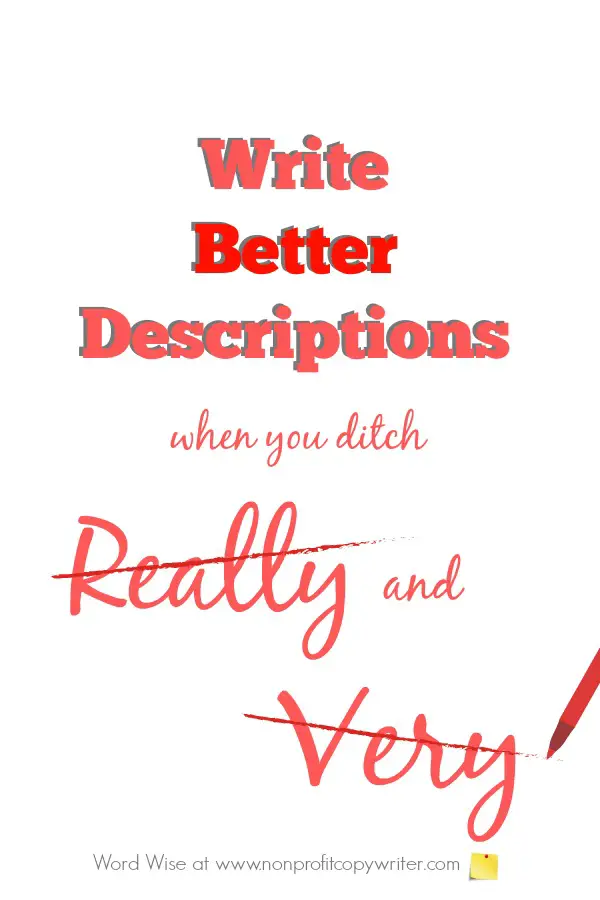Save Time: Get 5 Simple Writing Tips
you can put to use in 10 minutes
Really and Very: Write Better Descriptions When You Ditch These Two Words
Award-winning writer Kathy Widenhouse has helped hundreds of nonprofits and writers produce successful content , with 750K+ views for her writing tutorials. She is the author of 9 books. See more of Kathy’s content here.
You can write better descriptions by eliminating just two words from your content and your copy: really and very.
Why ditch these two words?
After all, they’re really simple and very easy to use.
Yep. And why is that?
Because really and very are a crutch … a lazy man’s way to write with emphasis.
You’ll write better descriptions – and better content – when you figure out a better way to make your point.
Don't Lose the Chance to Make a Point
Let’s look at an example. For instance, “really big” can take on many different meanings:
- A really big suitcase can be a bulky suitcase or a monstrous suitcase. One is over-packed. The other is hard to manage at the airport.
- A really big bodyguard can be a hefty bodyguard or a towering bodyguard. One has bulging muscles. The other has to bend down to avoid hitting his head.
- A really big impact can be a sizable impact or an historic impact. One makes a difference. One makes a difference for decades.
And likewise, “very beautiful” can be:
- A very beautiful girl that’s a stunning girl (she stops traffic) or a big-hearted girl (the kind you want to bring home to meet your family).
- A very beautiful sunset that’s a picturesque sunset (that you see in travel brochures) or a memorable sunset (that marked your tenth anniversary).
- A very beautiful moment that’s a bittersweet moment (when your teenage daughter waves goodbye from the driver’s seat) or a profound moment (when grandfather’s bandages came off).
When you use “really” or “very,” you lose out on the chance to be more specific and make a point.
Use Really and Very as Signals To Help You Write Better Descriptions
When you’re tempted to use “really” or “very” – or when you find these two words as you self-edit – think of them as red flags. They’re a signal.
Use them to help you find your point and then emphasize it.
The best approach is a very practical one. In your content, simply identify the word that follows an instance of “really” or “very.” Then look up its synonyms. For example, when you see that you’ve written “really great,” then look up “great” in a thesaurus.
You’ll discover all kinds of words for “great” ranging from immense to vast to illustrious to distinguished to excessive to heroic to groovy – and more. The list helps you pin down what you mean by “great.”
You’ll be forced to think about and decide what you’re trying to say. You’ll have a list of words to use as a starting point. It takes a bit of work, but ultimately you’ll eliminate “really great” and write a better description.
Just as a nervous laugh or a bit of sarcasm cover up your self-consciousness in a conversation, really and very can be a cover up in your writing. You use them when you don’t know how to make your point.
Ditch them and you’ll write better descriptions.
Really.
More Quick Writing Tips
10 Simple Writing Tips for Beginners (and Seasoned Writers) ...
Much, Many or Most: Which Makes for the Clearest Writing?
9 Quick Content Writing Tips for Beginners (and Pros!) ...
Simplify Your Writing: Why Word Choice Matters ...
Slay Superlatives to Show, Rather Than Tell ...
3 Tips for Writing Easy To Read Content ...
3 Great Reasons to Use an Online Word Count Tool ...
Quick Tip to Get Started Writing Strong Each Day ...
5 Copywriting Fixes to Make You Sound Professional ...
How to Weed out Weasel Words ...
Easy Copywriting Tricks Anyone Can Master ...
5 Simple Ways to Write Cleaner for Better Results ...
Tip for Writing Clearly: Put "Only" In Its Right Place ...
Passive Voice: it's an easy fix with this writing tip ...
Readability Check: an easy way to write cleaner ...
Self-Editing Tip: Start a sentence with the subject, not extra words ...
More quick writing tips on our Pinterest board ...
Return from Write Better Descriptions When You Ditch Just 2 Words
to Nonprofit Copywriter home
As an Amazon Associate I earn from qualifying purchases.
Share This Page

Named to 2022 Writer's Digest list
BEST GENRE/NICHE WRITING WEBSITE


Stop Wasting Time!
Grab your exclusive FREE guide, "5 Simple Writing Tips You Can Put to Use in 10 Minutes or Less"












